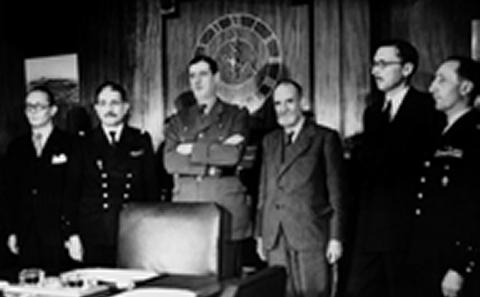Governments-in-Exile and the Jews during the Second World War Event

- Date:
- 21 - 22 March 2010
- Venue:
- Nuffield Theatre Highfield Campus University of Southampton SO17 1BJ
Event details
A two Day Conference. In collaboration with Fondation Pour la Mémoire de la Shoah, The Parkes Institute in Humanities, and the Faculty of Law Arts and Social Sciences at the University of Southampton and Vallentine Mitchell, Holocaust Studies.
The Parkes Institute for the Study of Jewish/non-Jewish Relations at the University of Southampton is organizing a research project which will explore the responses of the anti-Hitler Allies to the Jewish plight during the Second World War. An international two-day symposium to be held at the University of Southampton on 21 and 22 March 2010 and focusing on the various governments-in-exile established in Britain during the war will form an integral part of this project. This symposium aims to bring together scholars engaged in academic research on the bystanders to the Holocaust through a specific and so far neglected area of Holocaust research. The project - based on a comparative analysis of individual cases - intends to explore whether a theory of common taxonomy can be applied across the exiled Governments' treatment of Jewish issues. Were there any common features of the responses of the governments-in-exile to the Jewish plight? Did the governments cooperate? Are there any similarities in the theoretical analysis of their conduct?
While the subject of the bystanders to the Holocaust has constituted an important part of Holocaust research in the last decades, historians have focused mainly on the two major Western Allied powers, the United States and United Kingdom. There has not been any comprehensive investigation of how the other members of the anti-Hitler alliance helped to shape attitudes and responses to the Nazi persecution and extermination of the European Jewry. The governments of Belgium, Czechoslovakia, France (Free France), Greece, Luxemburg, the Netherlands, Norway, Poland, and Yugoslavia will form be the main focus of the conference.
The official national representatives in exile were theoretically in a position to impact on the attitudes of their populations at home towards the Jews. As it seems, their main responses to the Holocaust was fostering the exchange of information among the populations in the occupied countries, the exiles, and the major Allied governments. Project and symposium will examine the policies of the governments-in-exile, the actions they actually took (including attempts, if there were any, to impact on initiatives by the Western Allies for the rescue of Jews), and the factors that shaped their policies and actions. The latter includes the role played by the main national underground organizations that informed the governments-in-exile about the sentiments among the populations at home towards the persecuted Jews. Across Nazi occupied Europe the harsh German occupation regime triggered a resurgence in nationalism but this tended to exclude groups which were seen as foreign, and this often meant the Jews as well. Hence the governments-in-exile were caught in a network of complex influences, and this dynamic needs to be investigated.
The Parkes Institute for the Study of Jewish/non-Jewish Relations at the University of Southampton welcomes contributions from senior scholars as well as researchers at the beginning of their academic careers.
We intend to publish the conference proceedings in order to stimulate further discussion of the issues raised at the symposium. Holocaust Studies, published by Vallentine Mitchell, has already expressed an interest subsequent to the standard review process. It is expected that symposium and subsequent publication of the proceedings will lead to the establishment of an international network of scholars working on related areas of research that will facilitate further projects in the field.
For more information, contact the project coordinator, Jan Láníček, e-mail: J.Lanicek@soton.ac.uk